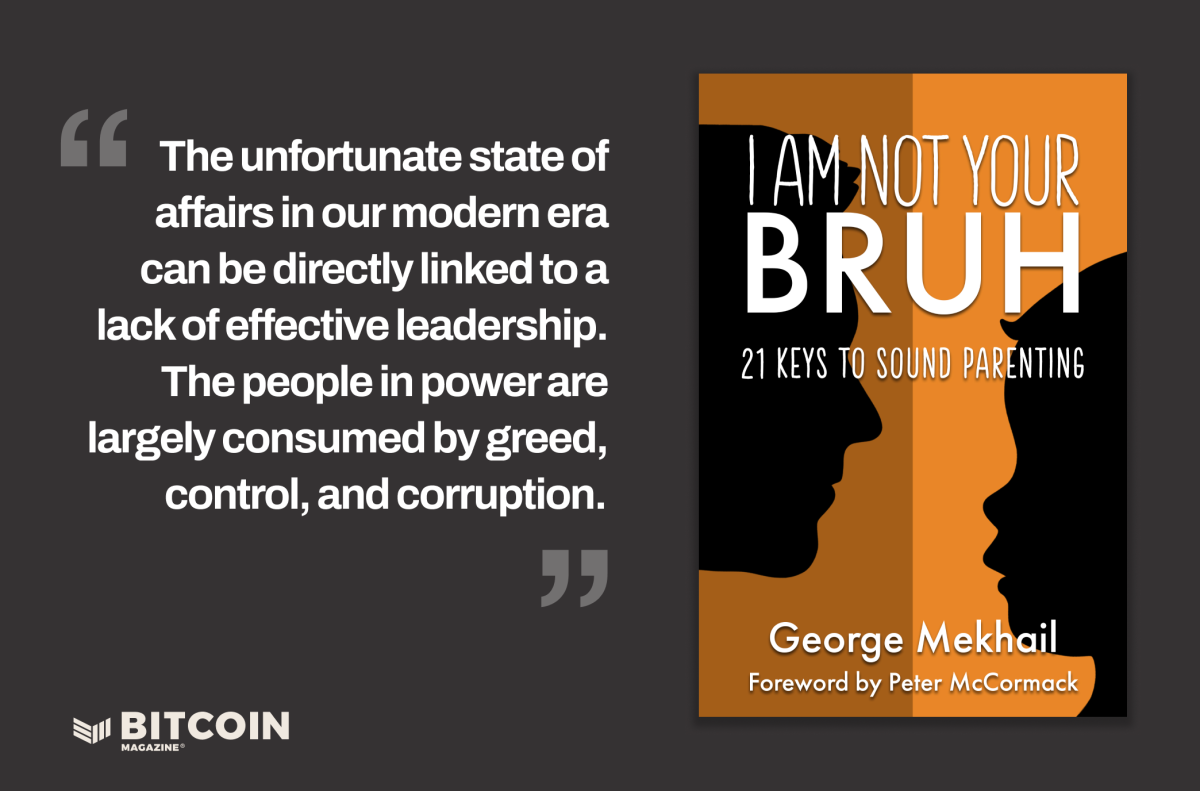The following is an excerpt from “I Am Not Your Bruh: 21 Keys to Sound Parenting” by George Mekhail. Visit the Bitcoin Magazine Store to order your copy of the book, on sale today.
I started using this phrase as my final words to the kids when dropping them off at elementary school and I continue to use it to this day as they are getting ready to go hang out with friends or leave the house. Danielle and I frequently talk about one of our primary intentions with parenting is raising kids who are becoming leaders. The concept of leadership in our world has become somewhat elusive if not straight up confusing. Leadership is not the same as authority and it’s not the same as popularity. Just because you are President of the United States, it doesn’t make you a leader, or at the very least, it doesn’t automatically make you an imitable leader. Being a celebrity also doesn’t equate to being a leader worthy of following, even though many celebrities boast countless “fans” following them on social media, watching their every move in the tabloids, or even admiring them as role models. Effective leadership has become the only thing in this world scarcer than Bitcoin.
The unfortunate state of affairs in our modern era can be directly linked to a lack of effective leadership. The people in power are largely consumed by greed, control, and corruption. This is partly due to a woefully misaligned incentive structure exacerbated by a broken monetary system, which allows the rich to easily become richer and the corrupt to accelerate unchecked in their corruption. We’ll explore this topic in more depth later, but it’s almost as if things have gotten so bad that those who occupy positions of power are no longer even concerned about optics. They are flaunting and taunting their oppression as if to say, “What are you going to do about it?” I believe part of the answer to that question requires playing the long game through Sound Parenting. If the next generation of parents commits to a vision of raising up the next generation of strong leaders, we will begin to make meaning- ful progress in humanity’s shared struggle for the ideals of freedom, peace, and prosperity. If you consider every historic breakthrough during periods where humans have fought back and emerged victorious when faced with tyranny, you will find examples of strong leadership. At the end of the day, someone’s gotta raise the next George Washington, and there’s no reason that can’t be me or you.

Take Yourself Seriously
I find it funny when people say, “Don’t take yourself so seriously.” It’s like, how am I supposed to take myself then? I’m a fairly lighthearted individual; I like to make people laugh: I can also be over the top with my positive attitude. Life’s too short, begging to be taken by the horns and shaped into my every hope and dream. In that sense, I would say I do take myself seriously. If you don’t take yourself seriously, you certainly shouldn’t expect anyone else to take you seriously. And what a bummer way to live this one precious life. I say: take your- self seriously. Have lofty goals. Dream big. Fail often. Show up. Keep moving forward. Laugh loudly. Take risks. Be extra. Don’t hedge. And most importantly: teach your children to do likewise. Don’t listen to the insecurities of others who need you to shrink down so they can feel better about themselves. Don’t stifle dreams before they even have a chance to see the light of day. The world needs more boldness, more fear- lessness, and more outliers who are not afraid to stand up to bullshit. I guarantee you that every legendary historical figure took themselves seriously, took their dreams seriously, and went about their business very seriously. Make no mistake, this is an active, ongoing, continual decision that requires constant self-reflection and self-awareness. It requires not worrying about what people think of you. Every time you decide to take yourself seriously, you are taking steps to not only achieving your goals, but also fulfilling your God-given potential.
Take Responsibility
Each of our lives can be boiled down to a series of deci- sions. Every day we are becoming someone, and the person we are becoming is made up of the choices we make. With every circumstance we face, we can decide: how will I navi- gate this? It is our response to every question that emerges, whether it’s expected, fair, or difficult. The truth is we are each equipped with the ability to evaluate these situations and decide the best course of action. The combination of utilizing our abilities to respond appropriately demonstrates one of the most beautiful words in the English language: responsibility. Seriously, can we just take a moment to appreciate how rich this word is and how consequential it is in this game of life? Making good choices and being good leaders requires taking responsibility. Teaching our children how to take responsibility for their life is a foundational goal of quality parenting. The baby steps to achieving this outcome start with helping them recognize the real-world impact of every decision. To zoom out even further, it’s helping them see how much of their present situation boils down to the numerous decisions they’ve already made. Yes, everyone has different abilities. Yes, everyone has different response tools at their disposal. But by the same token, everyone has the opportunity to embrace their own set of responsibilities based on their given circumstances. The mark of effective leadership is found in one’s willingness to carry greater responsibility than what would otherwise be reasonably expected of them. Strong leaders crave responsibility and tend to seek it out proactively. In turn, they also have a propensity to make wise, thoughtful, and intentional decisions in every situation they face.
On the flip side, poor decision-making can be described as an inability to effectively respond to a given situation. Let’s call it response-inability for fun. This is often a hallmark of not only poor leaders but also those who we might describe as sheeple, NPCs, or blind followers. Consider how many poor decisions are made as a result of “peer pressure” or “following orders.” These are not the type of kids we are trying to raise. We want lions, not sheep. The world is sadly inundated with uncritical thinkers who are raising uncritical thinking kids who lack the tools to embrace responsibility— and who would rather have someone else make decisions for them. Poor decisions tend to compound, sadly much faster than wise decisions. Once this momentum gets going, you have a recipe for outcomes like addiction, pain, and ultimately regret.
No Regrets When You’re 80
As far as we know, we only live once. There will only ever be one George Samir Naguib Mekhail Saad Nasir Massoud. As much as it would be helpful to have, there is no undo button in life. You can’t command Z your way through existence. “No regrets when you’re 80” is more of a personal refrain I’ve adopted, but I’ve used it with my kids to help illustrate the implications and importance of mindful decision-making and numbering your days. We all have regrets; things we wish we would have done differently or things we wish we could change. I approach the idea of regret as strictly describ- ing something that is literally unchangeable. Oftentimes we ascribe the word regret to situations that can actually be changed but would be very difficult or require a lot of discom- fort to actualize said change. Some people will say, “I regret the way things went with Justine,” when in reality, they can pick up the phone and give ol’ Justine a call to mend a relation- ship. You might not need to give her a call today, but perhaps sometime before you’re 80 you can eliminate at least one regret from your list. I call this mantra to mind when I’m faced with a particularly large decision in order to help me put the options into perspective. The question behind the phrase is: if I decide to do X, what is the likelihood that I will regret this decision when I’m near the end of my life?
It’s helpful to note that the idea of avoiding regret can devolve into an unhealthy obsession, which may cause one to limit risk-taking and expressing creativity. This is not what I’m proposing. Rather, we must find a healthy balance when it comes to limiting situations where irreversible regret is created. Most critically, we must coach our children on the importance of their decision-making early in life and help them understand how these decisions will compound, like interest, over time. The sooner our kids learn to take respon- sibility for every action in life, the more mature, wise, and self-reliant they will become. Good decisions lead to outstand- ing character. Outstanding character produces excellent leaders. Excellent leaders, raise children who exceed them in every category because that was the goal all along.







